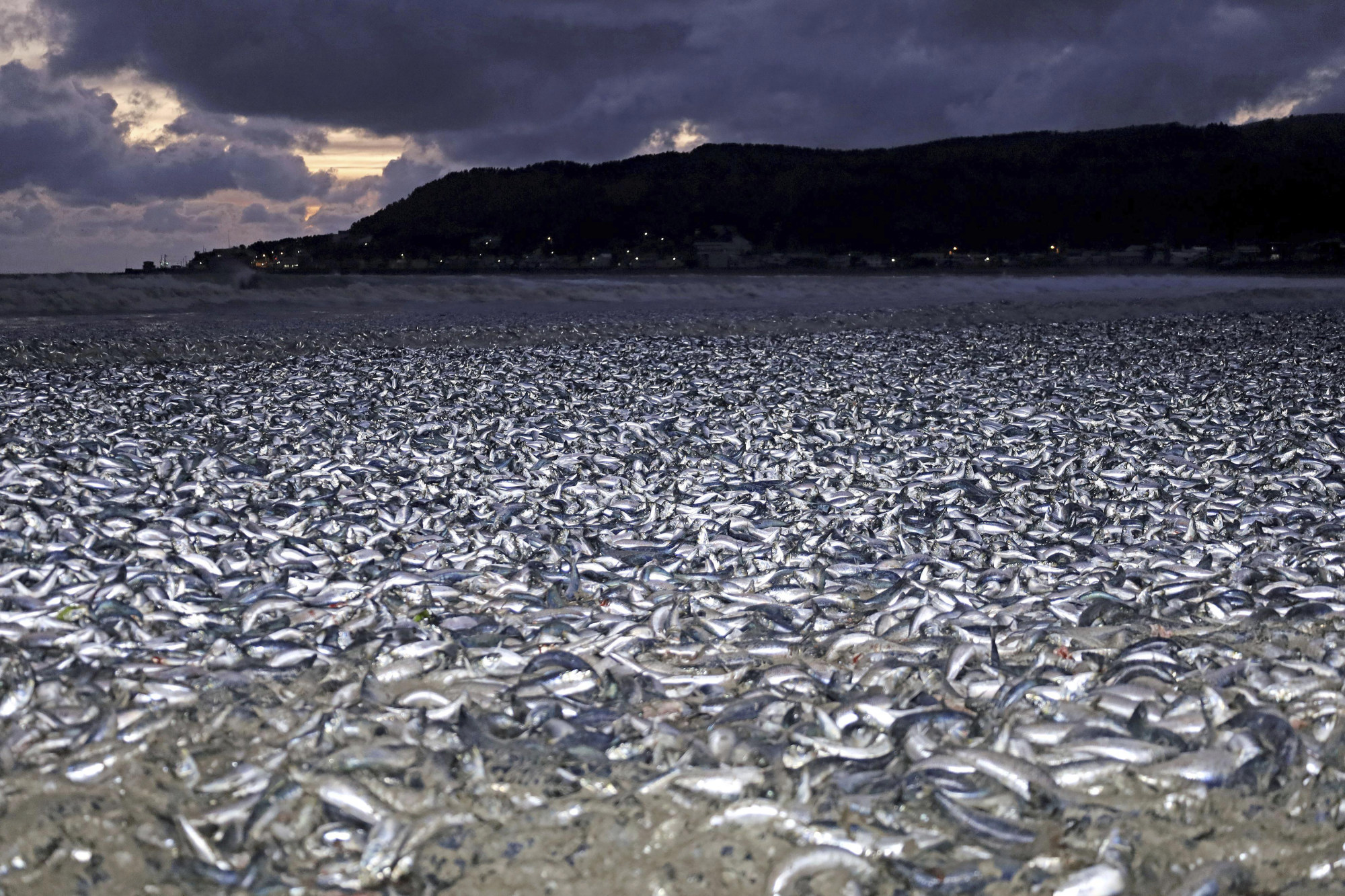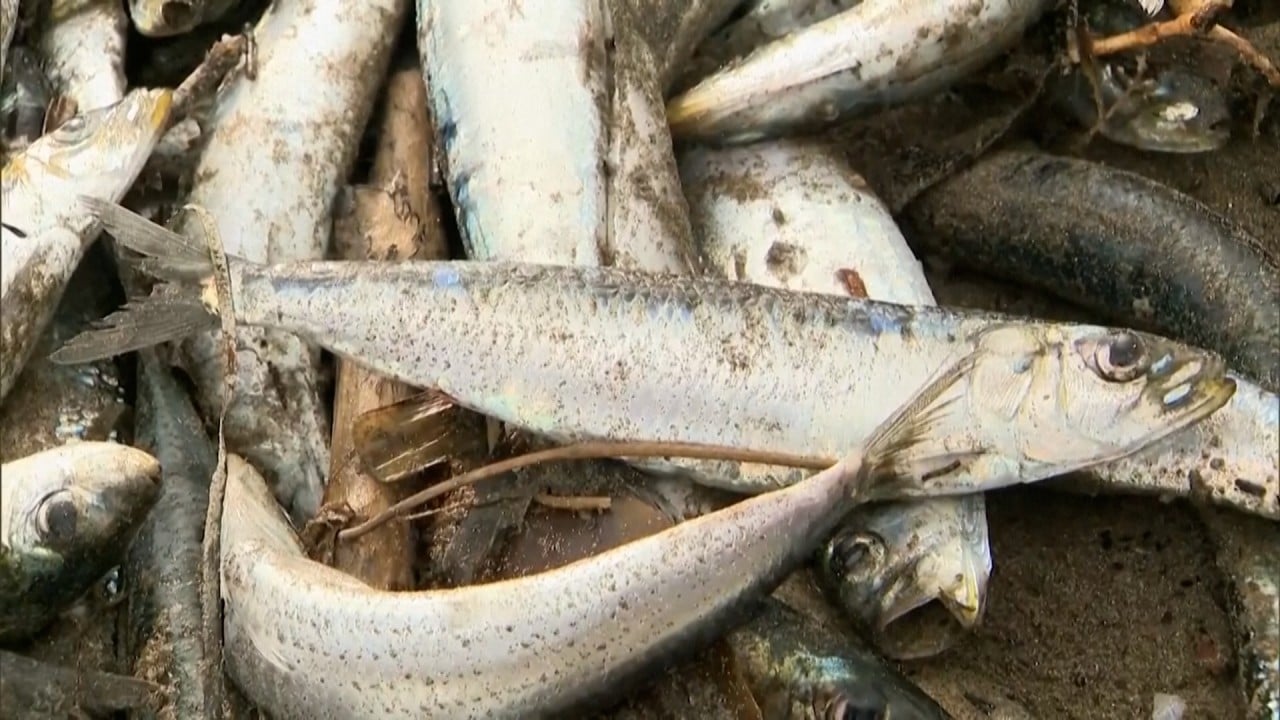Japan slams ‘sensationalist’ UK tabloid report linking mass fish death to Fukushima water
[ad_1]
“We are angry and disappointed at this report,” said the fisheries ministry official, who declined to be named. “This sort of phenomenon, of schools of fish dying and being washed ashore, is fairly common around the world, and it has absolutely nothing to do with the Fukushima power plant.
“The story in the newspaper said the two issues are linked, and that is simply inaccurate and sensationalist.”
The Daily Mail article did mention that marine experts said the fish were likely to have died from a lack of oxygen in the shallow waters off Toi village, or because the large school of sardines and mackerel had been weakened after they encountered a sudden pocket of much colder water as they migrated along the east cost of Hokkaido.
The story emphasised, however, that “this particular phenomenon occurred just three months after Japanese authorities began releasing treated radioactive water back into the sea – a move which angered its neighbours, including China and South Korea”.
It offered no scientific evidence to support a link to the water from the nuclear plant, Japanese officials pointed out, but triggered reports citing “conspiracy theories” in other media, including Indian online outlet WION, New Delhi Television and Britain’s Mirror newspaper.
As Japan pushes to sell Southeast Asia more seafood, will consumers bite?
As Japan pushes to sell Southeast Asia more seafood, will consumers bite?
The original Daily Mail article has been shared online more than 800 times and attracted more than 400 readers’ comments, the majority expressing alarm.
“They’ll kill us all,” read one reader’s remark, while another added, “Terrifying.”
Another message – in all capital letters – read: “I did not like that decision when it was proposed and yes, this is the result. Now bigger fish will eat the radioactive fish and swim long distances all the way up the world’s food chain and into all humans and animals that eat fish. Thanks, Japan, for indirectly nuclear bombing the planet Earth.”
According to authorities, olive flounders caught on December 1 around 4km to the northeast and 5km to the southeast of the mouth of the undersea pipeline constructed to release the water from the power plant into the Pacific Ocean, had “not detectable” amounts of radiation.
Unsubstantiated reports like this damage public understanding of the issues
Even anti-nuclear groups that have been campaigning for a halt to the release of treated water from the plant agree that there is no evidence of a link to the dead fish, and they argue that inaccurate reporting of the issues actually undermines their efforts.
“There are frequent reports of large number of fish being washed ashore in Japan and elsewhere, and I really do not think anyone should link the radioactive water from Fukushima with this incident in Hokkaido,” said Hajime Matsukubo, secretary general of the Tokyo-based Citizens’ Nuclear Information Centre.
“The marine experts say it was almost certainly a result of low temperatures or low oxygen levels in the water and there is no evidence of other reasons,” he said.
“Our organisation, and others that are opposed to the release of water from the plant, want transparency and openness from the government,” he said. “Unsubstantiated reports like this damage public understanding of the issues and the credibility of the work these groups are doing.”

Azby Brown, lead researcher for the nuclear and environmental monitoring organisation Safecast Japan, agreed there was “virtually no possibility” of the dead fish being linked to water from Fukushima, adding that it would be more accurate to say there was “absolutely no possibility, but it is difficult to talk in ‘absolutes’ in science”.
Brown said there were several reasons why radiation was highly unlikely to have been the cause of the Hokkaido incident, not least that the amount of radiation in waters just 1km off the plant was “difficult to detect”. Tol is around 600km north of the Fukushima plant.
“There are a lot of possible explanations that are a lot more plausible than contaminated water, and this just strikes me as clickbait, alarmist reporting,” Brown said.
“The problem, of course, is that these sorts of reports tend to go viral, although I have not seen that so much with this report as it did not seem to catch people’s imagination,” he said, adding that readers need to “check the scientific facts” in stories published in tabloid media.
[ad_2]
Source link






